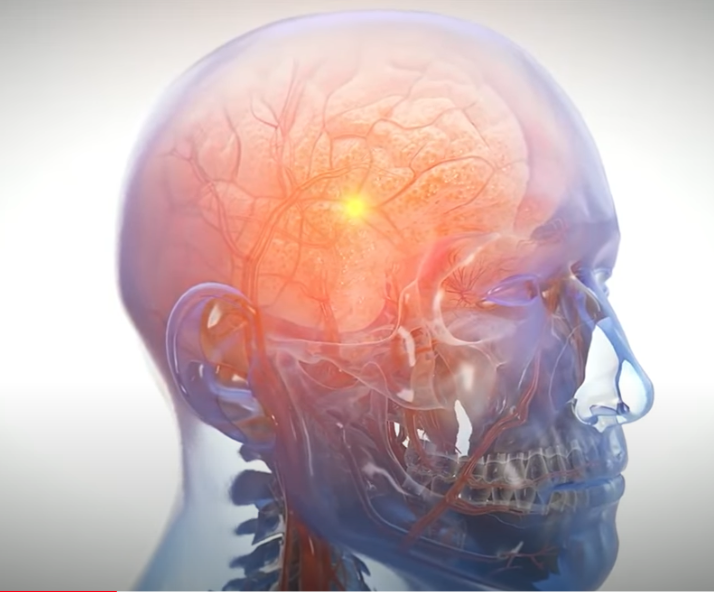A long-term brain injury may be caused by problems in pregnancy, during birth, or in an accident; whether a sporting accident, vehicle accident, slip and fall, or other types of accidents or purposeful actions. In many cases, when you suffer a traumatic brain injury, your cognitive and physical processes are affected enough so that you need a caregiver to help you with simple tasks. If you or a loved one is suffering from a brain injury from a recent incident, contact a California brain injury lawyer for a free consultation.
Traumatic Brain Injury Basics
A concussion is considered a type of traumatic brain injury. Most brain injury causes are by a blow or jolt to the head or when something penetrates the skull. The brain is a strange creature in that the same injury applied with the same force to two different people may result in different symptoms, and even different recovery outcomes. It is difficult for doctors to predict how long a brain injury may last, which means getting an experienced brain injury lawyer is important so that you are sure that you get the compensation you are entitled to.
Symptoms of a brain injury may include:
- Confusion: You may forget where you are or what you are doing. You may go into a room for something and not remember what you went in there for. You may even “remember” leaving your keys, purse or wallet in a certain place only to find it in a different place.
- Being dazed: This means that your thoughts are not clear. It’s like walking around in a fog all day. Being dazed is a form of confusion.
- Feeling dizzy and/or not being able to keep your balance: You may feel dizzy sporadically or all of the time. If the dizziness is bad enough, it might cause you to feel nauseous whether you are standing, sitting or lying down.
- Loss of coordination: You might drop things or constantly bump into things. You may lose fine motor coordination needed to write or you may lose gross coordination needed to walk a straight line.
- Loss of consciousness for any period of time: If you lose consciousness for a few minutes or less, the brain injury may not be as bad. However, if you lose consciousness for several minutes or longer, you may have a more serious brain injury.
- Vomiting and/or nausea: This may be caused by dizziness or may be caused because of the location you sustained a hit to the head.
- Headaches: Some people suffer from headaches even though they don’t have a brain injury. If you have never had headaches before you hit your head, this could be a sign of a brain injury.
- Feeling tired all the time or sleeping more than you would normally sleep: If you feel as if you can’t stay awake, even when you are active, and you suffered a hit to the head, you could have a brain injury.
- Insomnia: Everyone experiences those long nights where you just can’t fall asleep once in a while. However, if it’s happening very frequently, even every night after you suffered a hit to your head, you may have a brain injury.
- Issues with speaking including slurred speech and not recalling words: If you find that you can’t get a word from your brain to your mouth or your speech is slurred, you could be suffering from a minor or major traumatic brain injury.
- Blurry vision: If blurry vision does not clear up after a hit to the head and it cannot be corrected, you should contact your doctor to check you for a brain injury.
- A chronic bad taste in your mouth: A hit to the head could damage the part of your brain that processes taste.
- Tinnitus: Ringing in the ears is often a sign of damage to your eardrums from loud noises such as listening to loud music or shooting a gun without ear protection. However, traumatic brain injuries could also cause tinnitus.
- Being sensitive to sound and/or light: As with taste, a hit to your head could affect the way your brain processes what you hear or see. If you become sensitive to light and/or sound after a hit to the head, your doctor should check you for a brain injury.
- The inability to concentrate: If it feels as if you cannot bear to complete a task, you may have lost your ability to concentrate.
- Depression: Traumatic brain injury could lead to depression because of the symptoms you are experiencing or because you feel like you are a burden on your caregiver. No matter how many times your caregiver assures you that you are not a burden, or how much you try to convince yourself that you can deal with the symptoms, it may still lead to depression. You may even feel that these feelings are not normal, but they are. If you are suffering from depression, it is treatable.
- Anxiety: Everyone gets anxious. However, some people have a sudden feeling of intense anxiety. The anxiety may be over something as small as a household object in the wrong place or as extensive as worrying about your health. Anxiety, like depression, is also treatable.
- Mood swings: The location of the brain injury may cause excessive mood swings. You may or may not notice the mood swings. If a loved one mentions your mood swings after you suffer a hit to the head, you should get checked for a brain injury, even if you’ve already been checked.
- Seizures: This is a symptom that could take months or even years after a traumatic brain injury to show up. According to MN Epilepsy Group, a seizure could show up to 30 or more years later. Seizures are treatable with medications, but those medications could make you feel tired.
- Dilated eyes (one or both): Depending on where you hit your head, one or both of your eyes may be dilated. This could become a problem when you drive, especially if you are stopped.
- Having clear fluid draining from your ears or nose: If you notice fluid draining from your ears, nose or both, you should get to the emergency room right away. Let the emergency room nurses and doctors know that you suffered a hit to your head.
- Numbness or weakness in your toes and/or fingers: The area you hit your head may be the area that controls the nerves that lead to your fingers and toes. It may also be the area that processes feelings for your fingers and toes. Numbness and weakness could make it difficult for you to walk, balance, and do things with your hands that require fine motor control.
- Coma: A coma could last a few days, or it could last months (or even many years).
Any of these symptoms could make your life more difficult. Traumatic brain injury usually comes with more than one, depending on the severity of the injury. The symptoms may last for a few days, many years or permanently.
A traumatic brain injury lawyer will work with expert witnesses who are medical professionals to review your medical records. An experienced TBI lawyer will work with experts to formulate a case for you to receive compensation based on how long the expert witnesses believe your injury and the symptoms may last.
Living With a Brain Injury
All brain injuries have the potential to be life-altering. You may need help with doing simple tasks. This means that you have to wait for a family member to help you. If you have home health care coming in to help you, you may have to wait a day or more, depending on when the aide is scheduled to visit you. This could lead to depression and/or anxiety. As part of your settlement for pain and suffering, you are entitled to compensation to see a psychologist or psychiatrist to help you work through these feelings.
Sometimes family and part-time home health care aren’t enough. During the settlement process or before the trial, if you believe that it won’t be enough, let your attorney know that you need additional help. Our traumatic brain injury attorneys will help you get the full-time care you need.
Adjusting to Life With a Traumatic Brain Injury
While compensation doesn’t make you whole again, it does help you with the extra costs involved in living with a brain injury. You may be entitled to compensation for:
- Medical bills: This includes the current bills for your initial treatment and future medical bills if your injury is expected to be long-term or permanent. Experienced brain injury attorneys work with expert witnesses who are medical professionals not involved with your care. The expert witnesses review your medical records and testify at a trial as to your condition and why they expect your condition to be long-lasting or permanent. The compensation you get for medical bills include:
- Initial treatment for the brain injury and other injuries you may have suffered in the accident;
- On-going treatment for traumatic brain injury and other injuries;
- Psychological treatment for emotional pain and suffering, depression, anxiety and other psychological issues you may have because of the accident;
- Speech therapy
- Occupational therapy;
- Cognitive therapy; and
- Physical therapy.
- Lost wages: Even with a mild traumatic brain injury, you might miss work for a few days. The insurance company or the at-fault person is responsible for paying you for those days you miss. Lost wages also includes the time you lose from work for a long-term or permanent disability.
- Replacement or repair of damaged or destroyed property: If your traumatic brain injury is due to an auto accident or another accident that damaged or destroyed your personal property, the insurance company pays to repair or replace that property. This may include vehicles, your home, yard, and personal effects in your vehicle or home.
- Losses: When you suffer from a traumatic brain injury, your family also suffers. You may not be able to do the things you used to do, whether household tasks or recreational time with your family. You and your family are entitled to compensation for these losses.
- Inconvenience: If you are the one who always mows the yard, does the maintenance on the house, does the grocery shopping and even cleans the house and you now have to hire someone to do these chores, part of your settlement may include compensation to pay for these services.
- Death: Nothing can ever bring back a loved one that has died because of a traumatic brain injury. It doesn’t matter if the death took place within a few days of the injury or it took place years down the line. Chances are, your loved one would have lived longer if not for the brain injury caused by the actions or inactions, whether negligent or not, of another person. The compensation you may receive for the death of a loved one helps remove some of the financial stress from these trying times.
Dealing With Insurance Companies
Insurance companies are out to make a profit. In many cases, they are going to offer you the least amount possible to make you go away. A traumatic brain injury lawyer makes sure that you have the best chance to obtain what you are entitled to. In many cases, the insurance company’s limits are not nearly enough to cover the medical bills for your injuries, much less compensate you for the losses and life-changing events you and your family are going through.
If You Still Have Questions Ask Brain Injury Lawyer at the Gomez Firm

An attorney builds a case based on your medical records and individual circumstances to pursue the compensation you need, including punitive damages if the defendant’s actions were grossly negligent or done to injure you. This includes suing the defendant and/or other entities that may be at fault in an accident, such as the owner of an establishment or a trucking company, in addition to the person who caused the accident.
Contacting An experienced TBI attorney can recognizes that the job is to tell the survivor’s story—including not just the medical history, but also the personal harms to the survivor and his family.







